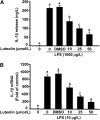Luteolin inhibits microglia and alters hippocampal-dependent spatial working memory in aged mice
- PMID: 20685893
- PMCID: PMC2937579
- DOI: 10.3945/jn.110.123273
Luteolin inhibits microglia and alters hippocampal-dependent spatial working memory in aged mice
Abstract
A dysregulated overexpression of inflammatory mediators by microglia may facilitate cognitive aging and neurodegeneration. Considerable evidence suggests the flavonoid luteolin has antiinflammatory effects, but its ability to inhibit microglia, reduce inflammatory mediators, and improve hippocampal-dependent learning and memory in aged mice is unknown. In initial studies, pretreatment of BV-2 microglia with luteolin inhibited the induction of inflammatory genes and the release of inflammatory mediators after lipopolysaccharide (LPS) stimulation. Supernatants from LPS-stimulated microglia caused discernible death in Neuro.2a cells. However, treating microglia with luteolin prior to LPS reduced neuronal cell death caused by conditioned supernatants, indicating luteolin was neuroprotective. In subsequent studies, adult (3-6 mo) and aged (22-24 mo) mice were fed control or luteolin (20 mg/d)-supplemented diet for 4 wk and spatial working memory was assessed as were several inflammatory markers in the hippocampus. Aged mice fed control diet exhibited deficits in spatial working memory and expression of inflammatory markers in the hippocampus indicative of increased microglial cell activity. Luteolin consumption improved spatial working memory and restored expression of inflammatory markers in the hippocampus compared with that of young adults. Luteolin did not affect either spatial working memory or inflammatory markers in young adults. Taken together, the current findings suggest dietary luteolin enhanced spatial working memory by mitigating microglial-associated inflammation in the hippocampus. Therefore, luteolin consumption may be beneficial in preventing or treating conditions involving increased microglial cell activity and inflammation.
Conflict of interest statement
Author disclosures: S. Jang, R. N. Dilger, and R. W. Johnson, no conflicts of interest.
Figures





Similar articles
-
Galantamine improves cognition, hippocampal inflammation, and synaptic plasticity impairments induced by lipopolysaccharide in mice.J Neuroinflammation. 2018 Apr 18;15(1):112. doi: 10.1186/s12974-018-1141-5. J Neuroinflammation. 2018. PMID: 29669582 Free PMC article.
-
Dietary Luteolin Reduces Proinflammatory Microglia in the Brain of Senescent Mice.Rejuvenation Res. 2016 Aug;19(4):286-92. doi: 10.1089/rej.2015.1708. Epub 2016 Feb 26. Rejuvenation Res. 2016. PMID: 26918466 Free PMC article.
-
Luteolin reduces IL-6 production in microglia by inhibiting JNK phosphorylation and activation of AP-1.Proc Natl Acad Sci U S A. 2008 May 27;105(21):7534-9. doi: 10.1073/pnas.0802865105. Epub 2008 May 19. Proc Natl Acad Sci U S A. 2008. PMID: 18490655 Free PMC article.
-
Can consuming flavonoids restore old microglia to their youthful state?Nutr Rev. 2010 Dec;68(12):719-28. doi: 10.1111/j.1753-4887.2010.00336.x. Nutr Rev. 2010. PMID: 21091915 Free PMC article. Review.
-
Brain "fog," inflammation and obesity: key aspects of neuropsychiatric disorders improved by luteolin.Front Neurosci. 2015 Jul 3;9:225. doi: 10.3389/fnins.2015.00225. eCollection 2015. Front Neurosci. 2015. PMID: 26190965 Free PMC article. Review.
Cited by
-
Genetic Deletion of Prostacyclin IP Receptor Exacerbates Transient Global Cerebral Ischemia in Aging Mice.Brain Sci. 2013 Jul 22;3(3):1095-108. doi: 10.3390/brainsci3031095. Brain Sci. 2013. PMID: 24634780 Free PMC article.
-
Luteolin for neurodegenerative diseases: a review.Pharmacol Rep. 2024 Aug;76(4):644-664. doi: 10.1007/s43440-024-00610-8. Epub 2024 Jun 21. Pharmacol Rep. 2024. PMID: 38904713 Free PMC article. Review.
-
Dietary broccoli mildly improves neuroinflammation in aged mice but does not reduce lipopolysaccharide-induced sickness behavior.Nutr Res. 2014 Nov;34(11):990-9. doi: 10.1016/j.nutres.2014.10.001. Epub 2014 Oct 7. Nutr Res. 2014. PMID: 25439028 Free PMC article.
-
Neurological effects of honey: current and future prospects.Evid Based Complement Alternat Med. 2014;2014:958721. doi: 10.1155/2014/958721. Epub 2014 Apr 27. Evid Based Complement Alternat Med. 2014. PMID: 24876885 Free PMC article. Review.
-
Six-Minute Walking Test Performance Relates to Neurocognitive Abilities in Preschoolers.J Clin Med. 2021 Feb 4;10(4):584. doi: 10.3390/jcm10040584. J Clin Med. 2021. PMID: 33557286 Free PMC article.
References
-
- Annan K. Demographics of older persons. New York; UN; 1998
-
- Wilson CJ, Finch CE, Cohen HJ. Cytokines and cognition: the case for a head-to-toe inflammatory paradigm. J Am Geriatr Soc. 2002;50:2041–56 - PubMed
-
- Wei J, Xu H, Davies JL, Hemmings GP. Increase of plasma IL-6 concentration with age in healthy subjects. Life Sci. 1992;51:1953–6 - PubMed
-
- Daynes RA, Araneo BA, Ershler WB, Maloney C, Li GZ, Ryu SY. Altered regulation of IL-6 production with normal aging. Possible linkage to the age-associated decline in dehydroepiandrosterone and its sulfated derivative. J Immunol. 1993;150:5219–30 - PubMed
-
- Ye SM, Johnson RW. Regulation of interleukin-6 gene expression in brain of aged mice by nuclear factor kappaB. J Neuroimmunol. 2001;117:87–96 - PubMed
Publication types
MeSH terms
Substances
Grants and funding
LinkOut - more resources
Full Text Sources
Medical
Molecular Biology Databases

